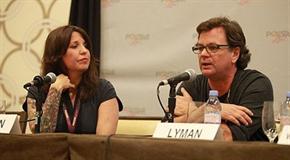Features
Pollstar Live! Cause Marketing
But there’s a whole range of good causes in the world and, according to this panel, concerts aren’t necessarily the best way to do good deeds. In fact, according to Jay Whitehead of Tickets For Charity, they are among the worst.
“One-offs are expensive and they don’t last very long,” Whitehead said. His company, Tickets For Charity, offers music and sports fans access to premium seats, special offers and unique VIP experiences. Each ticket sold generates a donation to good causes.
There’s a new generation of philanthropists working with like-minded people in the music industry to identify and implement programs that are far more effective in raising not just money, but awareness, to a wide variety of causes that fans and artists deem important.

Shaney Jo Darden of The Keep A Breast Foundation says her group’s main mission is about educating young people about cancer prevention.
“Being involved with tours like Warped, Mayhem, smaller club tours and with individual bands can involve having a booth or having a mini-kit at the merch booth,” she said. “We’re fortunate to be in a position to just be there.
“We’re passionate about breast cancer and prevention. Everybody knows somebody impacted by breast cancer. The bands often come to us, they get engaged, they tell us their story. Normally, our relationships begin with a band member first. They can wear a T-shirt or a bracelet. They may do a public service announcement.
“We’re weasels; we’ll weasel in any way we can. The bands get asked for so many money things so much. For us, it’s a constant challenge.”
Kris Zovich of Mick Artists Management and Rick Schaefer of The Artists Organization know about the time and money demands on artists; as managers they often have to handle – and sometimes reject – requests from charitable organizations to “do something.” Both manage artists that have formed their own charitable foundations to raise money for pet causes.
“It’s been easier to reach out to our fans and ask them to support us and our causes,” said Zovich, who is day-to-day manager for John Mayer. “There’s a bit of exhaustion with people being asked for donations. It’s important to see what the artist is doing.”
Schaefer, who has managed John Legend among others, agreed about donor fatigue. “A lot of our artists get asked all the time to do benefits,” he explained. “First, it has to be a cause the artist believes in. That’s often the hardest part. John Legend gets asked for like six benefits a week. Now he’s started his own foundation. But there’s bigger events that people want to be a part of, like the Sandy benefits. But there’s only so much time these guys have.”
Kevin Lyman’s 4fini produces the Vans Warped Tour, and started out doing production stage management for Lollapalooza. He believes in a subtle approach in bringing fans to the charity party, including adding a 25-cent-per-ticket charity surcharge. “We’ve done 7 million to 8 million tickets,” Lyman said. “You can cut it right into the deal.”
But he and others acknowledged it’s not always easy to get an artist or, more typically, its agent to sign off on the deal. “It’s frustrating,” Lyman said. “When you’re paying $100 for a ticket that extra quarter isn’t going to be a deal breaker.”
And often the charities themselves aren’t much help. “It’s a really antiquated segment that needs to be amped up. It’s extremely difficult to activate charities. One friend’s advice was don’t even bother going to get the charities to help you. It’s a bridge to nowhere.”
Darden and Whitehead agreed that “old school” charities often aren’t equipped to provide support to an artist or tour’s efforts on their behalf. “On one hand I can understand; (Lyman is) probably referring to nonprofits. But Keep A Breast is engaged. If you follow Keep A Breast, you know who we are, where we are, and what we’re doing all the time.”
But that’s changing, “There’s a new breed of charity that is young and are fully engaged, Lyman agreed. “It is generational. There’s a new generation of media-savvy charities out there now,” Whitehead said.
And many of those charities and cause-marketers are using data and studies to find new, more effective ways to get their messages across, including co-branding events, creating partnerships and taking advantage of simple human behavior.
“Part of our job is creating audience habits,” Whitehead explained. “As soon as we’ve created a habit among donors, they are very hard to break.”
With Warped festival-goers, Lyman used an example of how charitable habits develop.
“Three years ago we developed a guest list with $5 that goes to Musicares. At first, they were resistant. But now they expect it. They show up with the money in hand. Then somebody thought of giving a free ticket with a blood donation at Warped. Last year we were credited with 70,000 pints of blood.”
Fans bleed for Warped, and at the Virgin Mobile Free Festival, they’ll work to get into a free concert.
“At Virgin Mobile Free Fest, the tickets sell out every year. But you can do volunteer work and you will get in, no matter what,” moderator Donna Westmoreland said of the annual festival at Merriweather Post Pavilion.” And at the 9:30 Club were always something we are doing for tickets. We’re receiving clothes, canned goods, money donations. There’s a raffle for a free ticket for an entire year.”
But doing good can be something as simple as an artist literally wearing his cause on his sleeve. And Lyman and Darden have the perfect example of matching the right cause with an artist that is passionate about it.
“The ‘I Love Boobies’ shirt is not a hard sell to get the guys to wear onstage,” Lyman said, laughing.